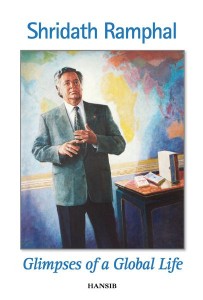Glimpses of a Global Life
Shridath Ramphal, Hansib Publications,
2014, 624 pp, ISBN 978-1-906190-92-7

Shridath ‘Sonny’ Ramphal was born in 1928 in New Amsterdam, British Guiana, to an Indo-Guyanese family. Having been educated at King’s College London, and later at Harvard Law School, Ramphal went on to live a decidedly ‘global’ life.
In his memoirs, Glimpses of a Global Life, Ramphal tells of his experiences working within international institutions, framing his place within the bigger picture of global politics. The book was released in November following a launch party at Marlborough House, the headquarters of the Commonwealth Secretariat and one of London’s best-known stately homes.
Among his acknowledgements, Ramphal speaks of his reluctance to write a set of memoirs, having been asked, somewhat insistently, by multiple friends and relatives, when his memoirs would emerge. He defines multiple reasons for not having written until now, one of these being that his story had not yet ended. His mind was changed over Christmas in 2011, the time of ‘resolutions’, he says, when he felt that it was not just the time, but his duty to begin writing.
Ramphal begins, somewhat unusually for a memoir, 100 years before his birth, with the abolition of slavery. But it was a key time because it formed the roots of Ramphal’s beginnings within British Guiana, a country built on the trade. The first section, ‘Beginnings’, in fact serves as less of a memoir and more of a depiction of the foundations that supported Ramphal’s life. Ramphal traces the history of the abolition of slavery, painting an extraordinary picture of his family’s life in Guiana.
He speaks of his interest in the voyage of women across the Kala Pani under the Indian indenture system and, in particular, the book Maharani’s Misery: Narratives of a Passage from India to the Caribbean, by Professor Verene Shepherd. It was a journey that his own great grandmother took, and a story which could easily have been her own. He begins the book in this way because the events helped to shape his life: “I am a child of all I have narrated,” he says.
There are eight parts to Ramphal’s memoirs, each of which could serve as a volume in its own right, every one covering an important era of Ramphal’s life. From his humble beginnings in British Guiana, Ramphal rose to become Foreign Minister of an independent Guyana, from 1972 to 1975, and later was the second Commonwealth Secretary-General, from 1975 to 1990.
One of the most moving sections of the book is that dedicated to the period of Apartheid in South Africa, described by Ramphal as “the most cruel legacy of slavery”. Ramphal recounts the importance of the Commonwealth community, and himself, in ending this legacy and helping to ensure that “the light of Apartheid’s end was faintly glowing” by the finish of his final tenure as Commonwealth Secretary-General. He speaks at length of the events leading up to the release of Nelson Mandela, whose freedom embodied that of black South Africa. In a chapter dedicated to Mandela’s freedom, Ramphal recounts his own words, emphasising the significance of Mandela’s release to the future of South Africa: “The human spirit survives in South Africa in many ways… But most of all, its survival is symbolised in the person of Nelson Mandela.”
The end of Ramphal’s time as Commonwealth Secretary-General was by no means the end of his story. He went on to become Chancellor of the Universities of Guyana, Warwick and West Indies, and served as the chair of the West Indian Commission. He was also recommended several times for the position of Secretary-General of the United Nations. In the final sections of his memoirs, Ramphal writes further of the ‘honours and intrigue’ inferred upon him, and how he was awarded honorary degrees from 28 universities and made an honorary fellow of another four.
Ramphal ends his memoirs, somewhat fittingly, with a story summing up his relationship with Nelson Mandela. In 1996 Ramphal had the pleasure of conferring upon Mandela an honorary degree from the University of Warwick. The graduation ceremony was a tremendous event held at Buckingham Palace and attended by eight top universities, but it is Warwick, and indeed Ramphal, that are said to have ‘stolen the show’ when Ramphal’s offer of a handshake was dismissed in favour of a familial embrace.
Glimpses of a Global Life is a truly fascinating look into the life of a key figure within the Commonwealth of Nations, serving not only as a memoir, but as a recollection of serious global issues spanning several decades. All this is presented in the form of a worldwide show, in which Ramphal stands centre stage, alongside a whole host of the world’s most prominent figures in international politics.





